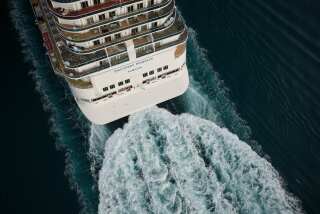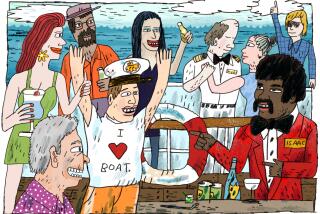Voyage to Greek Isles Promises a Special Magic
- Share via
My wife and I have been reading articles in old magazines about travel in Greece, particularly those having to do with cruising in the Greek islands. She has been squirreling the magazines away in preparation for our long-planned trip to Greece next week with a party of alumni from Pomona, Scripps and Pitzer Colleges and Claremont Graduate School.
My close study of photographs of Greek islands has led me to the conclusion that we’ll be cruising in our chartered ship to islands that bear a startling resemblance to our own Channel Islands. The chief difference between our islands, of which we have fewer than the Greeks, is that the Greek ones have ruins of ancient towns atop their cliffs and spines and old villages with restaurants that serve artichokes, figs and moussaka.
Our 297-foot-long ship, the Stella Maris II, will carry about 180 of us into four seas--the Aegean, the Mediterranean, the Ionion and the Sea of Crete. I think the prospect of sailing on these historic seas excites me a little more than the thought of tramping about ruins. By contrast, my wife is an ancient-ruin freak, and is talking about little else.
Not Just Any T-Shirt
Her enthusiasm has extended to her pre-cruise shopping. She has bought special walking shoes, socks and knee-length shorts for ruin tramping. But she is worried over the kind of T-shirt to buy to go with the shorts.
It must be, she says, a properly fashionable ruin-tramping T-shirt. This has been the subject of her morning musings over coffee for the last several days. I’ve tried to be sympathetic, but my mind has been on other matters, such as, is the Aegean really wine dark, as claimed by Homer, and was, say, the oracle at Delphi a ventriloquist, as claimed by Heron?
Heron of Alexandria (circa 150 BC) wrote of the mechanical mysteries of the ancient temples--the production of artificial thunder and lightning, self-sounding trumpets, self-kindling altars, statues that poured libations, ever-filling jugs, perpetual lamps, mechanical hissing serpents and whistling birds. My interest in the history of magic tips my mind in that direction.
Archeologist at Heart
I’m confident these weighty matters will be solved to my satisfaction by first-hand observations and by the authority of the learned professors who will accompany us on the cruise and share their knowledge with us as we clamber over the ruins of Herakleion, Knossos, Delos, Mykonos, Pylos and others.
My wife is really an archeologist at heart. One of her lifelong dreams has been to visit this ancient land, the seat of our western culture. A pile of venerable stones with the marks of long-gone men upon them thrills her to the verge of tears. I know I’d equal her emotional pitch if I were to discover in a museum a pair of loaded dice or a set of Greek cups and balls, a conjuring trick that dates back at least 2,000 years ago.
In this area I think I can show the professors a thing or two they may not know. While my wife has been shopping for our trip, I’ve been boning up on a cups and balls routine that is essentially like the one described in one of the Epistles of Alciphron, a Greek writer of the 3rd Century. Alciphron says the trick rendered him almost “speechless” and made him “gape with surprise.” I’m taking my set with me, with the hope my routine will have a similar effect on the professors.
Continuity of Creation
On balance, I think the most exciting overall part of this cruise will be the awareness, heightened by our instructors, that we’ll be traveling on lands and seas where a civilization made discoveries that are forever significant. Freedom was a Greek discovery. In the 5th Century, m Athens showed what free men living and working together can bring to pass. Greek art and Greek philosophy are living influences today.
It is this continuity of thought and creation spanning the centuries, including the rather insignificant cups and balls, that mutually stirs my wife and me. Incidentally, I’m sure that Greek women fretted over the proper attire for a tramp in the country while sipping wine with the husbands.
Thucydides, wisely reminding us of human continuity, wrote at the end of the Peloponnesian War: “The kind of events that once took place will by reason of human nature take place again.”
More to Read
Sign up for The Wild
We’ll help you find the best places to hike, bike and run, as well as the perfect silent spots for meditation and yoga.
You may occasionally receive promotional content from the Los Angeles Times.






